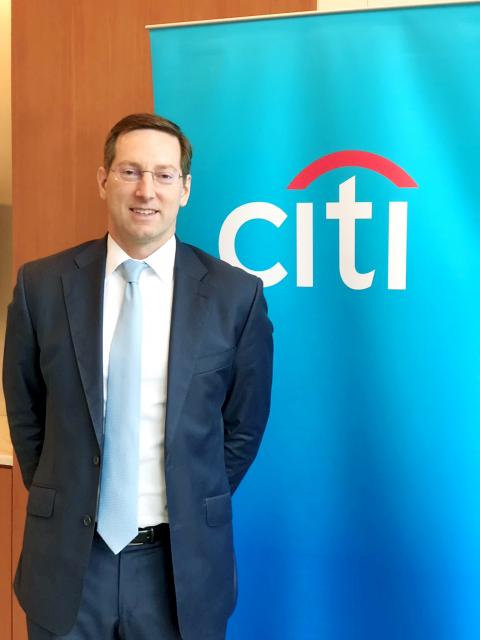Although a US-China trade dispute has increased uncertainty in the Asia-Pacific region, Asian economies have been growing faster than in Europe and the US, a Citigroup Inc official said yesterday.
Many Asian corporations are operating multinationals with the bank’s help, as Citi provides diverse financial tools for its clients, Citi Asia-Pacific markets and securities services head Stuart Staley said in an interview in Taipei.
However, as the trade dispute escalates, the region has moved into uncharted waters, with people looking for evidence to decide whether the macroeconomy will keep growing or fall into a recession, Staley said.

Photo: Kao Shih-ching, Taipei Times
“We have seen some investors stay on the sidelines, less willing to exploit the risks, and more corporations hesitate over whether to invest, as they do not know what the investment environment will look like in the future,” Staley said.
All of this has slowed activity, he said.
While some analysts have suggested that investing in Southeast Asia would be a solution to avoid trade issues, Staley said that tariffs have forced firms to reassess their supply chains.
However, due to the uncertainties, he has not seen many of his clients move to the region, he said.
Those that already have production capacity in the region, such as in Vietnam, might increase production there to avoid high tariffs on items made in China, he said.
However, those that do not have production bases in the region are more cautious, as they do not know what the trade dispute might become and are concerned about whether they could create a new supple chain in ASEAN, Staley said.
The US and China are expected to reach an agreement at some point, as the effect of the tariffs is so great for many companies worldwide, he said.
Asian firms are expanding operations into Asian countries outside China amid the trade dispute, creating “Asian-to-Asian trade,” and Citi, with its networks, has been helping these multinationals operate in those nations, Staley said.
“We help them with payments, cash management and other financial services. They have contributed to strong economic momentum for the region,” he said.
Through Citi’s network spanning more than 98 nations, it helps provide institutional investors access to global and local markets, he said.
With trading floors in more than 80 nations, along with clearing and custody networks in more than 60 countries and connections with 400 clearing systems, Citi maintains one of the largest global financial infrastructure platforms, with more than US$4 trillion in average daily cashflow, he said.
The bank faces some challenges in the region, as benchmark interest rates in Asia-Pacific are comparatively low, which increases pressure on some of Citi’s financial products, Staley said.
However, overall, Citi’s markets and securities services have been reporting fast growth in Asia, he said.

With an approval rating of just two percent, Peruvian President Dina Boluarte might be the world’s most unpopular leader, according to pollsters. Protests greeted her rise to power 29 months ago, and have marked her entire term — joined by assorted scandals, investigations, controversies and a surge in gang violence. The 63-year-old is the target of a dozen probes, including for her alleged failure to declare gifts of luxury jewels and watches, a scandal inevitably dubbed “Rolexgate.” She is also under the microscope for a two-week undeclared absence for nose surgery — which she insists was medical, not cosmetic — and is

CAUTIOUS RECOVERY: While the manufacturing sector returned to growth amid the US-China trade truce, firms remain wary as uncertainty clouds the outlook, the CIER said The local manufacturing sector returned to expansion last month, as the official purchasing managers’ index (PMI) rose 2.1 points to 51.0, driven by a temporary easing in US-China trade tensions, the Chung-Hua Institution for Economic Research (CIER, 中華經濟研究院) said yesterday. The PMI gauges the health of the manufacturing industry, with readings above 50 indicating expansion and those below 50 signaling contraction. “Firms are not as pessimistic as they were in April, but they remain far from optimistic,” CIER president Lien Hsien-ming (連賢明) said at a news conference. The full impact of US tariff decisions is unlikely to become clear until later this month

GROWING CONCERN: Some senior Trump administration officials opposed the UAE expansion over fears that another TSMC project could jeopardize its US investment Taiwan Semiconductor Manufacturing Co (TSMC, 台積電) is evaluating building an advanced production facility in the United Arab Emirates (UAE) and has discussed the possibility with officials in US President Donald Trump’s administration, people familiar with the matter said, in a potentially major bet on the Middle East that would only come to fruition with Washington’s approval. The company has had multiple meetings in the past few months with US Special Envoy to the Middle East Steve Witkoff and officials from MGX, an influential investment vehicle overseen by the UAE president’s brother, the people said. The conversations are a continuation of talks that

CHIP DUTIES: TSMC said it voiced its concerns to Washington about tariffs, telling the US commerce department that it wants ‘fair treatment’ to protect its competitiveness Taiwan Semiconductor Manufacturing Co (TSMC, 台積電) yesterday reiterated robust business prospects for this year as strong artificial intelligence (AI) chip demand from Nvidia Corp and other customers would absorb the impacts of US tariffs. “The impact of tariffs would be indirect, as the custom tax is the importers’ responsibility, not the exporters,” TSMC chairman and chief executive officer C.C. Wei (魏哲家) said at the chipmaker’s annual shareholders’ meeting in Hsinchu City. TSMC’s business could be affected if people become reluctant to buy electronics due to inflated prices, Wei said. In addition, the chipmaker has voiced its concern to the US Department of Commerce